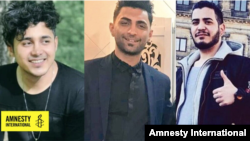Iranian lawyers representing three men sentenced to death for involvement in antigovernment protests last November say they have asked the judiciary for a retrial of their clients, potentially averting executions that many Iranians and President Donald Trump fear are imminent.
Defense lawyers Babak Paknia and Hosein Taj were quoted Wednesday by Iranian state media as saying they and a third attorney, Mostafa Nili, jointly submitted a request to the office of Iranian judiciary chief Ebrahim Raisi to overturn the death sentences against their three clients and retry the men. Nili tweeted that he, Paknia and Taj got full access to their clients’ court files for the first time earlier in the day.
Iran’s Supreme Court upheld the death sentences against defendants Amir Hossein Moradi, Mohammad Rajabi, and Saeid Tamjidi last Friday, according to an earlier tweet by Nili. The men, all in their mid-20s, had been convicted of vandalism, arson, waging war against the state and armed robbery for participating in the November 2019 nationwide protests against the government’s 50 percent increase in subsidized gasoline prices in a recession-hit economy.
Their lawyers, in a July 1 open letter published by state-approved news site jamaran.ir, already had denounced the judiciary’s case against their clients as based on “confessions that were extracted under aberrant conditions.” They also criticized what they said were irregularities in legal procedures, such as the judiciary’s persistent refusal up to that point to grant them access to the case files.
In a July 10 interview with the jamaran.ir, Paknia also said the three defendants “absolutely did not set fire to banks and cars” while participating in the November 2019 protests.
While some of the demonstrators looted and set fire to banks, gas stations and stores, London-based rights group Amnesty International (AI) said most were peaceful. Iranian security forces killed at least 300 people in a violent crackdown on the protests, AI has said.
Moradi was arrested as part of that crackdown in November 2019. Rajabi and Tamjidi were detained in December after being extradited to Iran from neighboring Turkey, to where they had fled the month before.
The lawyers said they based their request for a retrial of the three men on Article 477 of Iran’s Code of Criminal Procedure. It gives Iran’s judiciary chief the power to order the nation’s Supreme Court to overturn a verdict that he deems to be “evidently in contravention of Sharia (Islamic law)” and issue a new one.
In a 2016 report on Iran’s criminal code, Amnesty said Article 477 “provides a window of opportunity to reverse unjust decisions and miscarriages of justice.” But it said the legal provision also lends itself to abuse because the phrase “evidently in contravention of Sharia” allows the judiciary chief “to resort to uncodified laws to order that a judgment be overturned.”
In an interview with Iranian state news agency ISNA published Wednesday, Taj, one of the lawyers, expressed hope that next week, Raisi would order a retrial and suspend any plans to execute the three defendants.
In comments reported by Iranian state media Tuesday, Iranian judiciary spokesman Gholamhossein Esmaili confirmed the Supreme Court’s finalizing of the death sentences but did not say when they would be carried out.
Iran’s upholding of the death sentences, and its executions of several other Iranians in recent days for drinking alcohol, allegedly spying for the United States and membership of a banned Kurdish political party, prompted Iranians worldwide to flood Twitter with messages calling for a stop to Iran’s use of capital punishment. The Persian hashtag “Don’tExecute” trended globally on Tuesday, appearing in almost 4.5 million tweets according to The New York Times.
Trump took notice of the social media outpouring of support for the three Iranian protesters.
سه نفر در ایران برای شرکت کردن در تظاهرات محکوم به مرگ شده اند. اعدام آنها در هر لحظه قابل انتظار است. اعدام این سه نفر پیامی اسفناک به دنیا می فرستد و نباید انجام شود. #اعدام_نکنید
— Donald J. Trump (@realDonaldTrump) July 15, 2020
In his first Persian-language tweet in months, along with an identical English tweet posted Wednesday, Trump said the executions of Moradi, Rajabi and Tamjidi were “expected momentarily.”
“Executing these three people sends a terrible signal to the world and should not be done! #StopExecutionsInIran," Trump wrote.
“There are not many issues on which Iranians are united,” said Nazanin Boniadi, an Iran-born British-American actress and human rights activist, in a message to VOA Persian.
“Millions of us reacted to the upholding of the death sentences of these three young men and condemned it,” Boniadi wrote. “I hope Iran will hear these voices and stop forced confessions, imprisonments and executions of innocents.”
This article originated in VOA’s Persian Service.




